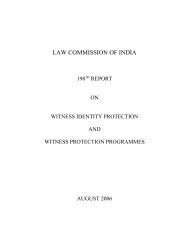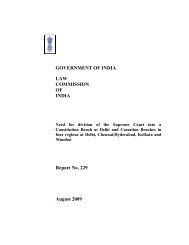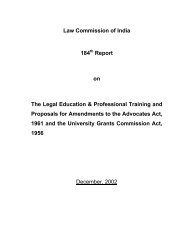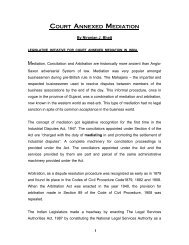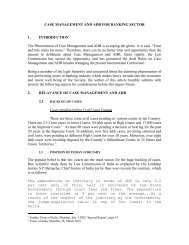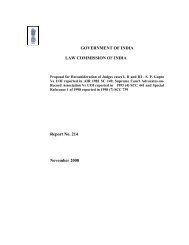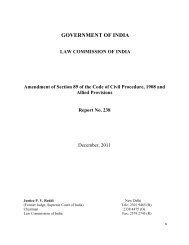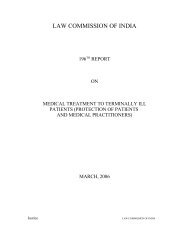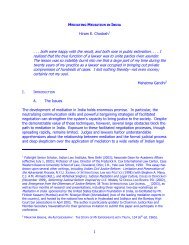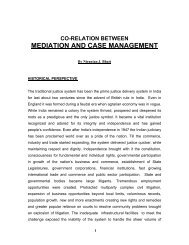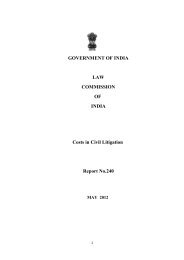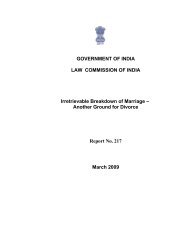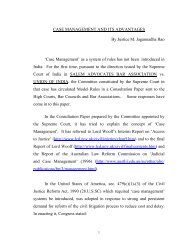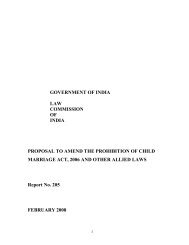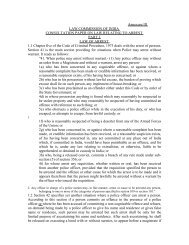concepts of conciliation and mediation and their differences - Law ...
concepts of conciliation and mediation and their differences - Law ...
concepts of conciliation and mediation and their differences - Law ...
Create successful ePaper yourself
Turn your PDF publications into a flip-book with our unique Google optimized e-Paper software.
CONCEPTS OF CONCILIATION AND MEDIATION AND THEIR<br />
DIFFERENCES<br />
by Justice M. Jagannadha Rao<br />
One <strong>of</strong> the questions constantly asked by many is as to what is meant<br />
by <strong>conciliation</strong> <strong>and</strong> <strong>mediation</strong>, whether they are the same <strong>and</strong>, if not,<br />
whether there are any <strong>differences</strong>?<br />
Conciliation <strong>and</strong> Mediation<br />
Whether, in common parlance, there is some difference between<br />
<strong>conciliation</strong> <strong>and</strong> <strong>mediation</strong> or not, it is however clear that two statutes by<br />
Parliament treat them as different. (a) In the year 1996, the Arbitration <strong>and</strong><br />
Conciliation Act, 1996 was passed <strong>and</strong> sec. 30 <strong>of</strong> that Act, which is in Part I,<br />
provides that an arbitral tribunal may try to have the dispute settled by use <strong>of</strong><br />
‘<strong>mediation</strong>’ or ‘<strong>conciliation</strong>’. Sub-section (1) <strong>of</strong> sec. 30 permits the arbitral<br />
tribunal to<br />
“use <strong>mediation</strong>, <strong>conciliation</strong> or other procedures”,<br />
for the purpose <strong>of</strong> reaching settlement.<br />
(b) The Civil Procedure Code (Amendment) Act, 1999 which introduced<br />
sec. 89, too speaks <strong>of</strong> ‘<strong>conciliation</strong>’ <strong>and</strong> ‘<strong>mediation</strong>’ as different <strong>concepts</strong>.<br />
Order 10 Rules 1A, 1B, 1C <strong>of</strong> the Code also go along with sec. 89.<br />
Thus our Parliament has made a clear distinction between <strong>conciliation</strong><br />
<strong>and</strong> <strong>mediation</strong>. In Part III <strong>of</strong> the 1996 Act (sections 61 to 81) which deals
with ‘Conciliation’ there is no definition <strong>of</strong> ‘<strong>conciliation</strong>’. Nor is there any<br />
definition <strong>of</strong> ‘<strong>conciliation</strong>’ or ‘<strong>mediation</strong>’ in sec. 89 <strong>of</strong> the Code <strong>of</strong> Civil<br />
Procedure, 1908 (as amended in 1999).<br />
Conciliation<br />
In order to underst<strong>and</strong> what Parliament meant by ‘Conciliation’, we<br />
have necessarily to refer to the functions <strong>of</strong> a ‘Conciliator’ as visualized by<br />
Part III <strong>of</strong> the 1996 Act. It is true, section 62 <strong>of</strong> the said Act deals with<br />
reference to ‘Conciliation’ by agreement <strong>of</strong> parties but sec. 89 permits the<br />
Court to refer a dispute for <strong>conciliation</strong> even where parties do not consent,<br />
provided the Court thinks that the case is one fit for <strong>conciliation</strong>. This<br />
makes no difference as to the meaning <strong>of</strong> ‘<strong>conciliation</strong>’ under sec. 89<br />
because, it says that once a reference is made to a ‘conciliator’, the 1996 Act<br />
would apply. Thus the meaning <strong>of</strong> ‘<strong>conciliation</strong>’ as can be gathered from<br />
the 1996 Act has to be read into sec. 89 <strong>of</strong> the Code <strong>of</strong> Civil Procedure. The<br />
1996 Act is, it may be noted, based on the UNCITRAL Rules for<br />
<strong>conciliation</strong>.<br />
Now under section 65 <strong>of</strong> the 1996 Act, the ‘conciliator’ may request<br />
each party to submit to him a brief written statement describing the “general<br />
nature <strong>of</strong> the dispute <strong>and</strong> the points at issue”. He can ask for supplementary<br />
statements <strong>and</strong> documents. Section 67 describes the role <strong>of</strong> a conciliator.<br />
Subsection (1) states that he shall assist parties in an independent <strong>and</strong><br />
impartial manner. Subsection (2) states that he shall be guided by principles<br />
<strong>of</strong> objectivity, fairness <strong>and</strong> justice, giving consideration, among other things,<br />
to the rights <strong>and</strong> obligations <strong>of</strong> the parties, the usages <strong>of</strong> the trade concerned
<strong>and</strong> the circumstances surrounding the dispute, including any previous<br />
business practices between the parties. Subsection (3) states that he shall<br />
take into account “the circumstances <strong>of</strong> the case, the wishes the parties may<br />
express, including a request for oral statements”. Subsection (4) is important<br />
<strong>and</strong> permits the ‘conciliator’ to make proposals for a settlement. It states as<br />
follows:<br />
“Section 67(4). The conciliator may, at any stage <strong>of</strong> the <strong>conciliation</strong><br />
proceeding, make proposals for a settlement <strong>of</strong> the dispute. Such<br />
proposals need not be in writing <strong>and</strong> need not be accompanied by a<br />
statement <strong>of</strong> the reasons therefor.”<br />
I shall briefly refer to the other provisions before I come to sec. 73.<br />
Section 69 states that the conciliator may invite parties to meet him. Sec. 70<br />
deals with disclosure by the conciliator <strong>of</strong> information given to him by one<br />
party, to the other party. Sec. 71 deals with cooperation <strong>of</strong> parties with the<br />
conciliator, sec. 72 deals with suggestions being submitted to the conciliator<br />
by each party for the purpose <strong>of</strong> settlement. Finally, Sec. 73, which is<br />
important, states that the conciliator can formulate terms <strong>of</strong> a possible<br />
settlement if he feels there exist elements <strong>of</strong> a settlement. He is also entitled<br />
to ‘reformulate the terms’ after receiving the observations <strong>of</strong> the parties.<br />
Subsection (1) <strong>of</strong> sec. 73 reads thus:<br />
“Sec. 73(1) settlement agreement. (1) When it appears to the<br />
Conciliator that there exist elements <strong>of</strong> a settlement which may be<br />
acceptable to the parties, he shall formulate the terms <strong>of</strong> a possible<br />
settlement <strong>and</strong> submit them to the parties for <strong>their</strong> observations. After
eceiving the observations <strong>of</strong> the parties, the Conciliator may<br />
reformulate the terms <strong>of</strong> a possible settlement in the light <strong>of</strong> such<br />
observations.”<br />
The above provisions in the 1996 Act, make it clear that the ‘Conciliator’<br />
under the said Act, apart from assisting the parties to reach a settlement, is<br />
also permitted to make “proposals for a settlement” <strong>and</strong> “formulate the terms<br />
<strong>of</strong> a possible settlement” or “reformulate the terms”. This is indeed the<br />
UNCITRAL concept.<br />
Mediation:<br />
If the role <strong>of</strong> the ‘conciliator’ in India is pro-active <strong>and</strong> interventionist<br />
as stated above, the role <strong>of</strong> the ‘mediator’ must necessarily be restricted to<br />
that <strong>of</strong> a ‘facilitator’.<br />
In <strong>their</strong> celebrated book ‘ADR Principles <strong>and</strong> Practice’ by Henry J.<br />
Brown <strong>and</strong> Arthur L. Mariot (1997, 2 nd Ed. Sweet & Maxwell, Lord on<br />
Chapter 7, p 127), the authors say that ‘<strong>mediation</strong>’ is a facilitative process in<br />
which “disputing parties engage the assistance <strong>of</strong> an impartial third party,<br />
the mediator, who helps them to try to arrive at an agreed resolution <strong>of</strong> <strong>their</strong><br />
dispute. The mediator has no authority to make any decisions that are<br />
binding on them, but uses certain procedures, techniques <strong>and</strong> skills to help<br />
them to negotiate an agreed resolution <strong>of</strong> <strong>their</strong> dispute without adjudication.”<br />
In yet another leading book on ‘Dispute Resolution’ (Negotiation,<br />
Mediation <strong>and</strong> other processes’ by Stephen B. Goldberg, Frank E.A. S<strong>and</strong>er
<strong>and</strong> Nancy H. Rogers (1999, 3 rd Ed. Aspine <strong>Law</strong> & Business, Gaithesburg<br />
<strong>and</strong> New York)(Ch. 3, p. 123), it is stated as follows:<br />
“Mediation is negotiation carried out with the assistance <strong>of</strong> a third<br />
party. The mediator, in contrast to the arbitrator or judge, has no<br />
power to impose an outcome on disputing parties.<br />
Despite the lack <strong>of</strong> ‘teeth’ in the <strong>mediation</strong> process, the<br />
involvement <strong>of</strong> a mediator alters the dynamics <strong>of</strong> negotiations.<br />
Depending on what seems to be impeding (an) agreement, the<br />
mediator may attempt to encourage exchange <strong>of</strong> information, provide<br />
new information, help the parties to underst<strong>and</strong> each others’ views, let<br />
them know that <strong>their</strong> concerns are understood; promote a productive<br />
level <strong>of</strong> emotional expression; deal with <strong>differences</strong> in perceptions<br />
<strong>and</strong> interest between negotiations <strong>and</strong> constituents (including lawyer<br />
<strong>and</strong> client); help negotiators realistically, assess alternatives to<br />
settlement, learn (<strong>of</strong>ten in separate sessions with each party) about<br />
those interest the parties are reluctant to disclose to each other <strong>and</strong><br />
invent solutions that meet the fundamental interests <strong>of</strong> all parties.<br />
Pr<strong>of</strong>. Robert Baruch Bush <strong>and</strong> Pr<strong>of</strong>. Joseph Folgen (ibid, p 136) say:<br />
“In a transformative approach to <strong>mediation</strong>, mediating persons<br />
consciously try to avoid shaping issues, proposals or terms <strong>of</strong><br />
settlement, or even pushing for the achievement <strong>of</strong> settlement at all.<br />
In stead, they encourage parties to define problems <strong>and</strong> find solutions<br />
for themselves <strong>and</strong> they endorse <strong>and</strong> support the parties’ own efforts<br />
to do so.”
The meaning <strong>of</strong> these words as understood in India appears to be<br />
similar to the way they are understood in UK. In the recent Discussion<br />
Paper by the lord Chancellor’s Department on Alternative Dispute<br />
Resolution (http://www.lcd.gov.uk/Consult/cir-just/adi/annexald/htm)<br />
(Annexure A), where while defining ‘Mediation’ <strong>and</strong> ‘Conciliation’, it is<br />
stated that ‘Mediation’ is a way <strong>of</strong> settling disputes by a third party who<br />
helps both sides to come to an agreement, which each considers acceptable.<br />
Mediation can be ‘evaluative’ or ‘facilitative’. ‘Conciliation’, it is said, is a<br />
procedure like <strong>mediation</strong> but the third party, the conciliator, takes a more<br />
interventionist role in bringing the two parties together <strong>and</strong> in suggesting<br />
possible solutions to help achieve a settlement. But it is also stated that the<br />
term ‘<strong>conciliation</strong>’ is gradually falling into disuse <strong>and</strong> a process which is<br />
pro-active is also being regarded as a form <strong>of</strong> <strong>mediation</strong>. (This has already<br />
happened in USA).<br />
The above discussion shows that the ‘mediator’ is a facilitator <strong>and</strong><br />
does not have a pro-active role. (But, as shown below, these words are<br />
differently understood in US).<br />
The difference between <strong>conciliation</strong> <strong>and</strong> <strong>mediation</strong>:<br />
Under our law <strong>and</strong> the UNCITRAL model, the role <strong>of</strong> the mediator is<br />
not pro-active <strong>and</strong> is somewhat less than the role <strong>of</strong> a ‘conciliator’. We have<br />
seen that under Part III <strong>of</strong> the Arbitration <strong>and</strong> Conciliation Act, the<br />
’Conciliator’s powers are larger than those <strong>of</strong> a ‘mediator’ as he can suggest<br />
proposals for settlement. Hence the above meaning <strong>of</strong> the role <strong>of</strong> ‘mediator’
in India is quite clear <strong>and</strong> can be accepted, in relation to sec. 89 <strong>of</strong> the Code<br />
<strong>of</strong> Civil Procedure also. The difference lies in the fact that the ‘conciliator’<br />
can make proposals for settlement, ‘formulate’ or ‘reformulate’ the terms <strong>of</strong><br />
a possible settlement while a ‘mediator’ would not do so but would merely<br />
facilitate a settlement between the parties.<br />
Brown quotes (at p 127) the 1997 H<strong>and</strong>book <strong>of</strong> the City Disputes<br />
Panel, UK which <strong>of</strong>fers a range <strong>of</strong> dispute resolution processes, facilitative,<br />
evaluative <strong>and</strong> adjudicative. It is there stated that <strong>conciliation</strong> “is a process<br />
in which the Conciliator plays a proactive role to bring about a settlement”<br />
<strong>and</strong> mediator is “a more passive process”.<br />
This is the position in India, UK <strong>and</strong> under the UNCITRAL model.<br />
However, in the USA, the person having the pro-active role is called a<br />
‘mediator’ rather than a ‘conciliator’. Brown says (p 272) that the term<br />
‘Conciliation’ which was more widely used in the 1970s has, in the 1970s, in<br />
many other fields given way to the term ‘<strong>mediation</strong>’. These terms are<br />
elsewhere <strong>of</strong>ten used interchangeably.<br />
Where both terms survived, some organizations use ‘<strong>conciliation</strong>’ to<br />
refer to a more proactive <strong>and</strong> evaluative form <strong>of</strong> process. However, reverse<br />
usage is sometimes employed; <strong>and</strong> even in UK, ‘Advisory, Conciliation <strong>and</strong><br />
Arbitration Service’ (ACAS) (UK) applies a different meaning. In fact, the<br />
meanings are reversed. In relation to ‘employment’, the term ‘<strong>conciliation</strong>’<br />
is used to refer to a mediatory process that is wholly facilitative <strong>and</strong> nonevaluative.<br />
The definition <strong>of</strong> ‘<strong>conciliation</strong>’ formulated by the ILO (1983) is<br />
as follows:
“the practice by which the services <strong>of</strong> a neutral third party are used in<br />
a dispute as a means <strong>of</strong> helping the disputing parties to reduce the<br />
extent <strong>of</strong> <strong>their</strong> <strong>differences</strong> <strong>and</strong> to arrive at an amicable settlement or<br />
agreed solution. It is a process <strong>of</strong> orderly or rational discussion under<br />
the guidance <strong>of</strong> the conciliator.”<br />
However, according to the ACAS, ‘<strong>mediation</strong>’ in this context involves a<br />
process in which the neutral “mediator takes a more pro-active role than a<br />
conciliator for the resolution <strong>of</strong> the dispute, which the parties are free to<br />
accept or reject. (The ACAS role in Arbitration, Conciliation <strong>and</strong><br />
Mediation, 1989). It will be seen that here, the definitions, even in UK, run<br />
contrary to the meanings <strong>of</strong> these words in UK, India <strong>and</strong> the UNCITRAL<br />
model.<br />
The National Alternative Dispute Resolution Advisory Council,<br />
(NADRAC), Barton Act 2600, Australia (see www.nadrac.gov.au) in its<br />
recent publication (ADR terminology, a discussion Paper, at p 15) states that<br />
the terms “<strong>conciliation</strong>” <strong>and</strong> “<strong>mediation</strong>” are used in diverse ways. ( The<br />
‘New” Mediation: Flower <strong>of</strong> the East in Harvard Bouquet: Asia Pacific <strong>Law</strong><br />
Review Vol. 9, No.1, p 63-82 by Jagtenbury R <strong>and</strong> de Roo A, 2001). It<br />
points out that the words ‘<strong>conciliation</strong>’ <strong>and</strong> ‘counselling’ have disappeared<br />
in USA. In USA, the word ‘<strong>conciliation</strong>’ has disappeared <strong>and</strong> ‘<strong>mediation</strong>’ is<br />
used for the neutral who takes a pro-active role. For example:<br />
“Whereas the terms ‘<strong>conciliation</strong>’ <strong>and</strong> ‘conselling’ have long since<br />
disappeared from the literature in reference to dispute resolution
services in the United States <strong>and</strong> elsewhere, these terms have<br />
remained enshrined in Australian family laws, with ‘<strong>mediation</strong>’<br />
grafted on as a separate dispute resolution service in 1991.”<br />
Conversely, policy papers in countries such as Japan still use the term<br />
‘<strong>conciliation</strong>’ rather than ‘<strong>mediation</strong>’ for this pro-active process (see<br />
www.kantei.go.jp/foreign/judiciary/2001/0612 report <strong>of</strong> Justice System<br />
Reform Council, 2001, Recommendations for a Justice System to support<br />
Japan in the 21 st Century). NADRAC refers, on the other h<strong>and</strong>, to the view<br />
<strong>of</strong> the OECD Working Party on Information, Security <strong>and</strong> Privacy <strong>and</strong> the<br />
Committee on Consumer Policy where ‘<strong>conciliation</strong>’ is treated as being at<br />
the less formal end <strong>of</strong> the spectrum while ‘<strong>mediation</strong>’ is at the more formal<br />
end. Mediation is described there as more or less active guidance by the<br />
neutrals. This definition is just contrary to the UNCITRAL Conciliation<br />
Rules which in Art 7(4) states<br />
“Art 7(4). The conciliator may, at any stage <strong>of</strong> the <strong>conciliation</strong><br />
proceedings, make proposals for a settlement <strong>of</strong> the dispute….”<br />
In an article from US entitled “Can you explain the difference<br />
between <strong>conciliation</strong> <strong>and</strong> <strong>mediation</strong>”<br />
(http://www.colorodo.edu/conflict/civil-rights/topics/1950.html), a number<br />
<strong>of</strong> conciliators Mr. Wally Warfield, Mr. Manuel Salivas <strong>and</strong> others treat<br />
‘<strong>conciliation</strong>’ as less formal <strong>and</strong> ‘<strong>mediation</strong>’ as pro-active where there is an<br />
agenda <strong>and</strong> there are ground rules. In US from the informal <strong>conciliation</strong><br />
process, if it fails, the neutral person moves on to a greater role as a<br />
‘conciliator’. The above article shows that in US the word ‘mediator’
eflects a role which is attributed to a pro-active conciliator in the<br />
UNCITRAL Model. In fact, in West Virginia, ‘Conciliation’ is an early<br />
stage <strong>of</strong> the process where parties are just brought together <strong>and</strong> thereafter, if<br />
<strong>conciliation</strong> has not resulted in a solution, the Mediation programme is<br />
applied which permits a more active role (see<br />
http://www.state.wv.us/wvhic/Pre-Determination/20comc.htm) The<br />
position in USA, in terms <strong>of</strong> definitions, is therefore just the otherway than<br />
what it is in the UNCITRAL Conciliation Rules or our Arbitration <strong>and</strong><br />
Conciliation Act, 1996 where, the conciliator has a greater role on the same<br />
lines as the ‘mediator’ in US.<br />
I have thus attempted to clear some <strong>of</strong> the doubts raised as to the<br />
meaning <strong>of</strong> the words ‘<strong>conciliation</strong>’ <strong>and</strong> ‘<strong>mediation</strong>’. Under our law, in the<br />
context <strong>of</strong> sec. 30 <strong>and</strong> sec. 64(1) <strong>and</strong> sec. 73(1) <strong>of</strong> the 1996 Act, the<br />
conciliator has a greater or a pro-active role in making proposals for a<br />
settlement or formulating <strong>and</strong> reformulating the terms <strong>of</strong> a settlement. A<br />
mediator is a mere facilitator. The meaning <strong>of</strong> these words in India is the<br />
same in the UNCITRAL <strong>and</strong> Conciliation Rules <strong>and</strong> in UK <strong>and</strong> Japan. But,<br />
in USA <strong>and</strong> in regard to certain institutions abroad, the meaning is just the<br />
reverse, a ‘conciliator’ is a mere ‘facilitator’ whereas a ‘mediator’ has a<br />
greater pro-active role. While examining the rules made in US in regard to<br />
‘<strong>mediation</strong>’, if we substitute the word ‘<strong>conciliation</strong>’ wherever the word<br />
‘<strong>mediation</strong>’ is used <strong>and</strong> use the word ‘conciliator’ wherever the word<br />
‘mediator’ is used, we shall be underst<strong>and</strong>ing the said rules as we underst<strong>and</strong><br />
them in connection with ‘<strong>conciliation</strong>’ in India.<br />
*********



